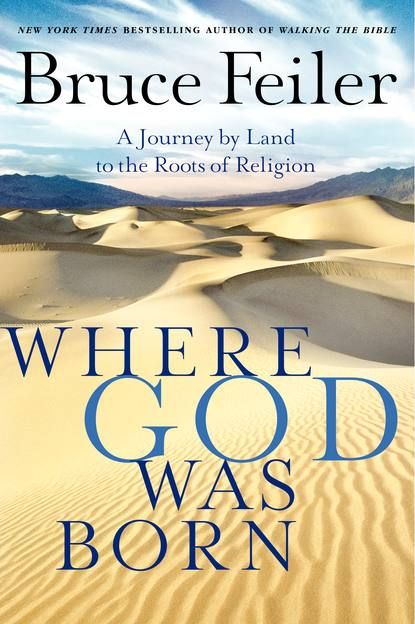 Where God Was Born: A Journey by Land to the Roots of Religion—this is one of many listings on Amazon.
Where God Was Born: A Journey by Land to the Roots of Religion—this is one of many listings on Amazon. Whilst reading the stories along the way, author Bruce Feiler retraces Hebrew Bible narratives in their original locales. As his own faith deepens and broadens, Feiler provides historical, cultural, archeological, and biblical perspectives on how and where the eternal, universal, ubiquitous God of Judaism, Islam, and Christianity began self-revealing to humanity and entered into covenant relationship with creation. Feiler's journey though bible lands is both ecumenical and interfaith; I especially appreciate his articulating some the typically overlooked and ignored fact of the immense influence Zoroastrianism has had on Judaism and Christianity (hey, people in classes I've taught, how many times have I tried to explain that?!).
I bought this book several years ago when an eBay seller didn't ship another book I'd bought and for a very long time also didn't respond to my emails. In the end I bought the other book locally because I needed it in time for a discussion I was leading and when the seller finally answered my emails and expressed many regrets, I chose Where God Was Born from his current offerings and I'm happy I did. It since has been issued in paperback, so I posted my amazon review under the paperback listing though I've linked to the hardcover I own. At first I was disappointed, since a total of about 100 pages near the beginning are the kind of "I went there; he said this; I went to another place; they said that" narrative of encounters a person remembers with warmth and that provide backstory for the entire experience, but that for anyone who wasn't there are better shortened into about a tenth of the space. I remember thinking, "despite my interest in the subject, this is going to be a 3-star review" but when I got into Feiler's substantial theological and historical observations, I discovered I'd been very mistaken.
Yes, Yahweh promised the Exodus wanderers a place and a space, promised to accompany them "into the land," but as Feiler points out, ultimately their identity as the people of God living in a covenant of grace, love, hospitality, and peace depended not upon geography or temple, but meant obediently keeping Torah. Wherever you were, wherever you wandered, any place you were sent, whether in Jerusalem or in diaspora at the furthest ends of the earth – unlike with those assorted place gods of the rest of the ancient near east – Yahweh was there. Page 194: "Wandering is holy, too. God is not exclusively a figure of the land; he's also a figure of the wilderness. He's a figure of all lands." On page 196, "With no access to sacred sites, sacred text becomes Israel's lifeline to its past." And the people of the God of history become people with a story.
I love the author's emphasis on the power of prophecy along with God's call to us to partner with heaven in re-creating justice and righteousness in a broken world. As Martin Buber pointed out, it is not the priest but the prophet who holds true power and authority. Through Yahweh's word spoken by prophets, scripture becomes a voice for and the voice of the broken, needy, and vulnerable. Created in the divine image, imago dei, humans also speak and live a creative, redemptive, reconciling word.
Where God Was Born includes an informal bibliography of additional resources and a comprehensive index. If any aspect of Bruce Feiler's journey interests you, I trust you'll enjoy and benefit from this book.
my amazon review: radical monotheism and the creative word

No comments:
Post a Comment
thanks for visiting—peace and hope to all of us!